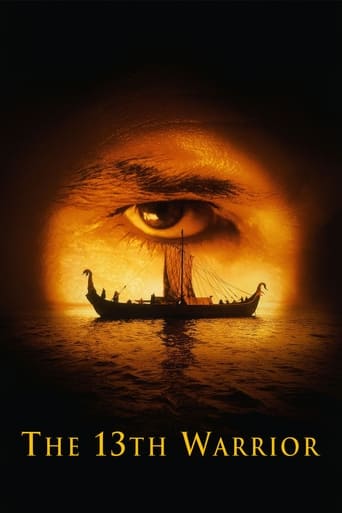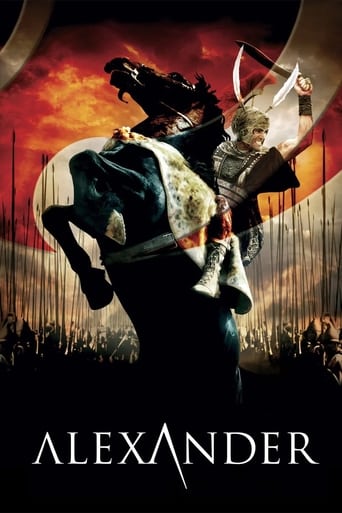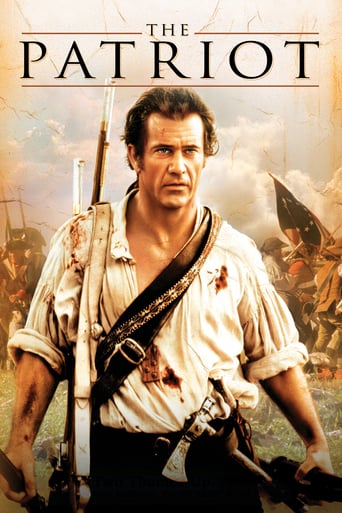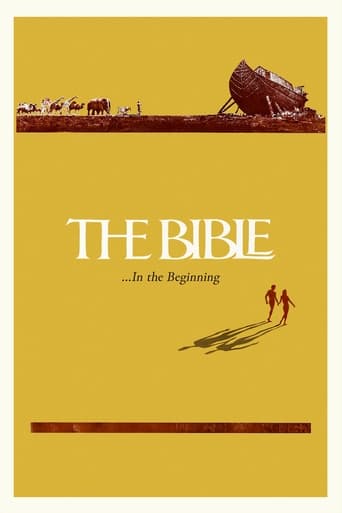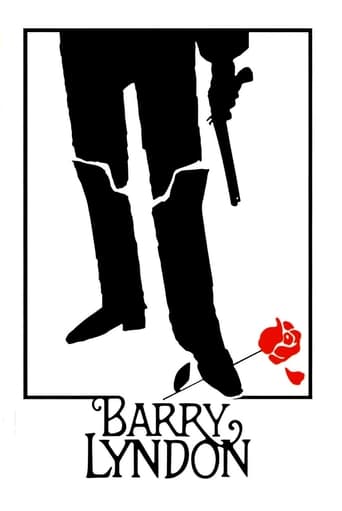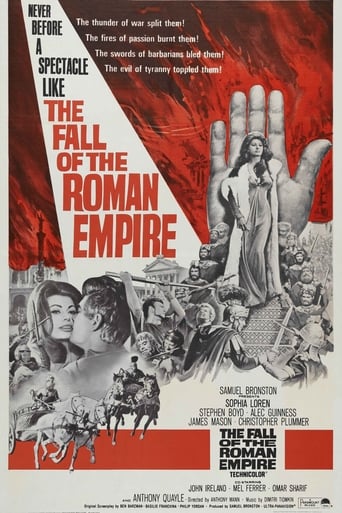
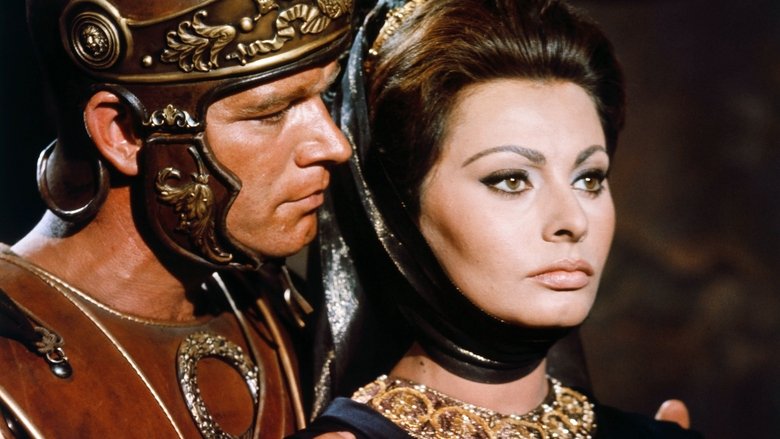
The Fall of the Roman Empire (1964)
In the year 180 A.D. Germanic tribes are about to invade the Roman empire from the north. In the midst of this crisis ailing emperor Marcus Aurelius has to make a decission about his successor between his son Commodus, who is obsessed by power, and the loyal general Gaius Livius.
Watch Trailer
Cast
Similar titles


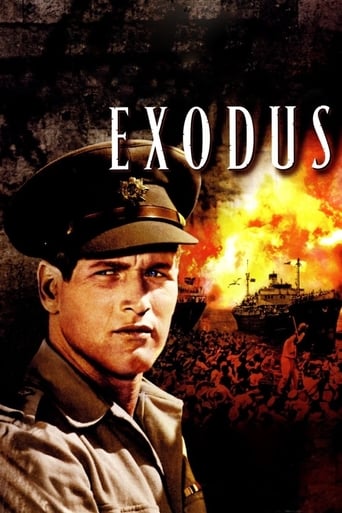
Reviews
That was an excellent one.
Boring
It’s an especially fun movie from a director and cast who are clearly having a good time allowing themselves to let loose.
All of these films share one commonality, that being a kind of emotional center that humanizes a cast of monsters.
Epic but not that great.Massive in its scale, sets, ambition and running time this movie is more about showing off how big you can make a movie than how well you can make a movie. Plot isn't entirely historically accurate, and is in some ways a soap opera with historical figures (and many fictional characters). This isn't helped by a fairly unconvincing performance in the lead role by Stephen Boyd. Wooden, lame and just plain irritating.Christopher Plummer and Sophia Loren are OK. Best performances come from James Mason and Alec Guinness, who both bring a suitable amount of gravitas to the movie.There is some degree of truth to the plot, and the battle scenes are great, and these are what make the movie not a total waste of time.
In my opinion, if what went on in this epic, $19 million, fiasco production was really supposed to be the way that the Romans carried on, then it's certainly no wonder, to me, why their precious, little empire fell.With all of the horrendously treacherous back-stabbing, betrayal and hypocrisy that prevailed, I'm actually very surprised that Rome didn't fall long before this.Set in the year 180 A.D., this film (with all of its grandiose, large-scale pomp & pageantry) shamelessly promised major historical events to unfold before the viewer's very eyes - But, unfortunately, it got seriously side-tracked and became "Hollywoodized" into a frickin' weepy, clinging, sappy "love story". (Ho-Hum!) This film's running time was a staggeringly unbearable 188 minutes! Featuring some truly amazing sets (plus 100s of extras, horses, chariots, and plenty of parading around saying "Hail, Caesar!"), it took this film's story 45 minutes of senseless gabbing (amongst its envious characters) to finally get to its very first battle scene. And by that time my interest in all of this utter nonsense had seriously waned to the point of numbed indifference.I found that I couldn't give a sweet damn about any of the characters here, including Alec Guinness's Marcus Aurelius who came across to me as being just a much younger version of his Obi-Wan-Kenobi character from Star Wars.In this story, the ego-driven actors either over-acted their parts, or else they under-acted - But, never once did any of them come across, to me, as being "real people". Whoever they were portraying in the story may have been considered big & great in their day, but their gutless performances rendered each and every one of them as small & petty to the max.Needless to say, this "Sword & Sandal" epic was a box-office failure. It only managed to make back but one-tenth of its $19 million costs upon its initial release back in 1964.This film's once-wealthy producer, Samuel Bronston (known for backing such expensive films as 1961's King Of Kings and El Cid), went bankrupt as a result of this film and was pretty much never heard from (in the movie business) ever again.Personally, I would never recommend this dreary picture to anyone. If it was skillfully edited down by a least an hour, then, perhaps, its entertainment value could be much more tolerated and appreciated.*Trivia note* Actress Sophia Loren, who played Lucilla, was the highest paid cast member, receiving an undeserved $1 million for her part.
The history of Rome begins with it's foundations in Roman myths and fell because it no longer believed in it's own future. In this film, the audience is allowed to witness it's slow decay from the top down. The authority which was Rome's diminished it's capacity to rule and no point more so than it's leader, Commodus (Christopher Plummer). Although the empire retained much of it's prestige, it's true force of arms failed to maintain it's ability to govern. In this movie that power dissolves in General Livius (Stephen Boyd) who despite being offered the seat of power, rejects it. As a result, the audience sees through it's pomp, Majesty and star power to see this movie for what it is, a dismal failure. Despite having Steven Boyd, Alec Guinness, James Mason and Anthony Quayle in it's cast the movie is long on rambling romance and very short on historical drama. Still, there are many good scenes with much appreciated character development. However, in the end, the movie lacks heart but is listed as a Historical Classic. ****
The classical epic has a long history in the cinema, dating back at least to Griffith's "Intolerance" of 1916, but it seemed to reach its peak around 1959/60 with those two great examples, Wyler's "Ben-Hur" and Kubrick's "Spartacus". By 1965, however, it was all but dead, although it was briefly revived in the early 2000s, killed off by the financial failure of "Cleopatra", a failure as spectacular as anything in the film itself, following which only one more film in the genre was made. It is perhaps fitting that "The Fall of the Roman Empire" was the film that marked the Fall of the Roman Epic.Like "Gladiator", the first film in the recent brief epic revival, the film deals with the death of the Emperor Marcus Aurelius and the disastrous reign of his son Commodus. Like "Gladiator" it takes considerable liberties with history, and has as its hero a fictitious general who is also the old Emperor's trusted friend (called Livius here, Maximus in "Gladiator"). The famous historian Will Durant was engaged as historical adviser, but the film's historical inaccuracies suggest that his advice was not always followed and he was reportedly not impressed by the finished product.The film opens with Marcus Aurelius conducting a war against the German tribes on the frontier. The ageing Emperor, however, is in poor health and knows that he has not long to live. He intends to nominate Livius as his successor, fearing that his son Commodus lacks the strength of character to rule the Empire. (In reality, Marcus Aurelius does not appear to have entertained any doubts about his son and named him as his successor). A group of courtiers, however, do not want to see Livius as Emperor, and conspire to have Marcus Aurelius poisoned. Commodus is proclaimed "undoubted Caesar". At first Livius is loyal to the new regime, but as Commodus's character deteriorates and his rule becomes increasingly tyrannical he has to decide where his loyalties lie.This is a film that it starts much better than it finishes. In the first half it promises to be an intelligent and thoughtful movie, much better than the average sword and sandal epic. The visual tone of the opening scenes is very different to that of most epics, with their gleaming marble and brilliant Mediterranean sunshine. These scenes, although actually filmed in the Sierra de Guadarrama near Madrid, are ostensibly set on the Roman Empire's northern frontier in southern Germany, and are set in winter amid snow-covered, pine-clad mountains. In place of marble there are fortifications of stone or wood, and in place of sunlight there is darkness relieved by the flickering of torches and braziers.The dominant character in the early scenes is not Livius but Marcus Aurelius, brilliantly played by Alec Guinness as a wise and humane but fatalistic philosopher-king. He does, however, have his weaknesses, especially his tendency to put political considerations above the good of his family, as when he promises his daughter Lucilla in marriage not to her beloved Livius but to the King of Armenia, hoping to gain political advantage from such an alliance. The other good performances come from James Mason as Aurelius's trusted adviser, the former slave Timonides (later revealed to be a secret Christian) and from Christopher Plummer as Commodus. He plays Commodus not as a basically wicked man- it is made clear that Commodus was not a party to the plot to assassinate his father- but rather as a weak man corrupted by the temptations of power, thus proving correct his father's assessment of his character. The relationship between Commodus and Livius in some ways parallels that between Messala and Ben-Hur; the two are originally firm friends, but later quarrel. The film appeared only a year before what has become Plummer's best-known and career-defining performance in "The Sound of Music", but for my money he is much better here.Unfortunately, the film deteriorates in the second half after Aurelius's death. The plot becomes not only increasingly historically inaccurate but also increasingly complex and difficult to follow. The action is now dominated by the figure of Livius, played by Stephen Boyd, who had played the part of the villainous Messala in "Ben-Hur". Although Boyd had been good in that film, he is much less assured here as the hero, and is rather wooden and lifeless.The film cost around eighteen million dollars to make, a huge sum for the 1960s, although less than half the amount spent on "Cleopatra". It was a costly financial failure at the box-office, partly because of the failure to secure a major star to play Livius. The part was originally written with Charlton Heston, the star of "Ben-Hur", in mind, but he turned it down, as did Kirk Douglas, the star of "Spartacus". If Heston had accepted the role, it would have reunited the producer (Samuel Bronston), director (Anthony Mann) and stars (Heston and Sophia Loren) of "El Cid" from 1961. In the end the role went to Boyd, better known as a supporting actor than as a star in his own right.Box-office success is not always the best guide to a film's artistic merits, and "The Fall of the Roman Empire" is a film with many positive virtues, especially in the first half. nevertheless, despite some distinguished acting contributions and some spectacular action sequences, such as the battle scenes, it falls short of the greatness of the likes of "Spartacus" or "Ben-Hur". 7/10




